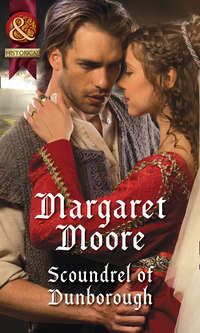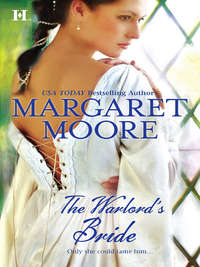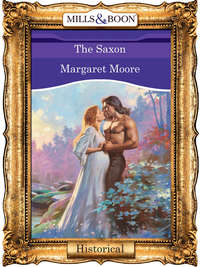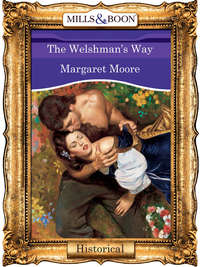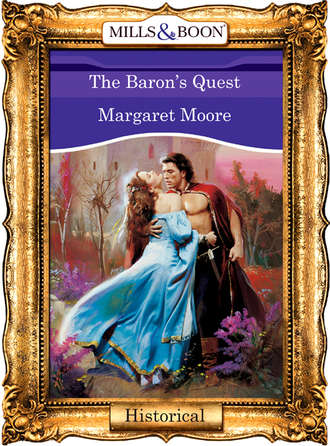
Полная версия
The Baron's Quest
“You felt it was better he was gone!” Gabriella Frechette cried impetuously, her hands drawing into fists at her side. “You were glad that there was no one to watch over you except my sick father! No one who might see your dishonesty!”
“Dishonesty?” Chalfront squeaked, growing red in the face.
“My steward has examined the account rolls of Castle Frechette and found nothing amiss,” Etienne said, believing Gabriella Frechette’s accusation was made of haste and hate. He had every confidence that Jean Luc, his steward of many years, would have noticed had anything been amiss with the castle’s financial records. “And I should not have to remind you again that you will speak only when you have been addressed,” the baron said to the young woman. He spoke not loudly, but with unmistakable firmness
Rather impressively and contrary to the reaction he had anticipated, she quickly regained her self-control. Her eyes still flashed with angry fire and she did not look at the bailiff, but it was clear she was capable of subduing her emotions when it was necessary. A most rare quality in a woman, and one completely unexpected.
“Why are you not married?” he asked suddenly, trying to confound her. When she did not answer, he said, “Well?”
“Excuse me, my lord, I did not realize you were addressing me.”
She was playing a dangerous game, this pretty woman with the defiant eyes standing before him in wounded pride and unbowed majesty. But she would lose. He would win this first test of his authority, because he must always win. “Why are you not married?” he repeated, and no one who heard the stern tone of his voice would have dared refuse to answer.
“Because I did not wish to be,” Gabriella Frechette said, some of her defiance replaced by obvious fear.
“My lord, if I may say so, Lady Gabriella tended to her parents most devotedly,” Chalfront stuttered, clearly terrified. “She said she would entertain no suitors while she did her duty to them.”
“I did not ask you for your opinion, bailiff,” the baron noted dispassionately. The man looked about to collapse, but that was of no concern to Etienne. He spoke only to the young woman. “Apparently your father was more shortsighted than I had been told, since his lack of concern for your future has left you on my hands. Is there no other family to whom you could go?”
“No.”
“You will address me as ‘my lord’ or ‘Baron,”’ he said.
“No, my lord,” she replied with undeniable scorn in her dark brown eyes.
What kind of creature was this? The boldest knights in England were more easily dominated than this wench. “Who fostered you?” he demanded.
“No one, my lord. My parents wished to raise us.”
“If you are as devoted to God as you were to your parents, you should go to a convent.”
“Excuse me, my lord?” Chalfront interrupted again, his voice like the squeak of a mouse.
The baron turned his impartial gaze onto the bailiff. “What is it?”
Chalfront cleared his throat nervously. “Lady Gabriella is penniless, my lord. It would cost some money for her to be accepted into a convent, and there is nothing left.”
“There are debts still unpaid, too,” Baron DeGuerre noted.
Suddenly Gabriella realized he had known more of her family history than he had indicated.
Obviously his questions, embarrassingly posed in front of the assembled servants and tenants, had but one purpose: to reveal her penniless state to everyone and shame her in public. He was a cruel and heartless man, worse than even the rumors had led her to believe!
She must have been mad not to see immediately the unfeeling creature he was. How could she have been so impressed with his strength and commanding presence when he did not temper those qualities with mercy? How could she have thought there was a hint of vulnerability in his aloofness? How could she ever have found him attractive, unless she had felt the same fascination for him that Eve had experienced for the snake in the Garden of Eden?
They were engaged in a battle, and Gabriella would not admit defeat, especially when Baron DeGuerre took a step toward her and made what she supposed was his idea of a smile. “However, I can be generous.”
The look in his eyes assured her that his idea of generosity was not one she would share.
Chapter Two
The baron reached into the wide, plain brown leather belt about his waist and produced a leather purse.
Gabriella had very little doubt what he might expect in the way of recompense for his “generosity,” this vain, arrogant bully who had tried to humiliate her in the courtyard of her own home. What kind of woman did he think he was dealing with? One like Josephine de Chaney, who had abandoned her morals for the sake of money? “I want nothing from you, my lord,” she said contemptuously.
Not a muscle moved in the baron’s handsome, impassive face.
“You...you have been most munificent, my lord,” Chalfront said anxiously, reminding Gabriella of his odious presence. “Surely everyone understands that.”
“Except this person,” the baron replied, his gaze still fastened upon her. “Whether you accept my gift or not, you will leave this castle and the village at once.”
“No, I will not. This is my home and—”
“If I order you to go, you will go.” The baron said the words quietly, but the menace was unmistakable. Then he smiled again. “You may stay in the castle if the tenants’ feelings are so vital to you. As a servant.”
It took a mighty effort, but Gabriella straightened her shoulders and said, “The tenants will be most upset if you make such an order.”
“The tenants?” he asked with a very slight hint of incredulity. “What care I for the feelings of the tenants?”
At his arrogant words, the mood of the crowd changed from one of dread to defiance.
“If they wish to remain on my land, they would do well to try to please me, not the late earl’s daughter,” Baron DeGuerre said. Then he slowly surveyed them, his impartial, chilling scrutiny resting for a brief moment on every person there.
They all fell silent and averted their eyes from his, their insolence gone as if he had physically taken it from them. One by one they silently went out the gate. “I will speak with you later, Chalfront,” the baron said, and Chalfront, obviously dismissed, joined the departing crowd.
“Goodbye, Gabriella Frechette,” Baron DeGuerre said before he turned on his heel and strode toward the hall, clearly convinced by her stunned silence he had won this skirmish. The other knight who had remained smiled cruelly and followed his master into the hall like a dog on a lead.
Gabriella stood in the courtyard all alone, feeling more abandoned than she had by her father’s death and even Bryce’s absence.
If she stayed, she would have to be a maid, humbled before the servants and tenants she had known all her life, the very people she had been raised to believe she had a duty to protect.
Was it so humiliating to be a servant? Had her father not praised many times the labor of his people and the worth of his hirelings who had built this place? Was it worse than being driven from her home?
The Frechettes were not cowards. This was her family’s home and had been for generations; Baron DeGuerre could not force her to leave, however he tried. Besides, there was the very real chance that Bryce would return one day, and who could say what might happen if she were not there? She could not count on Baron DeGuerre or Robert Chalfront to tell her brother where she had gone.
Also, as the baron surely knew—to his discredit—it would be too dangerous for a woman with no money and no escort to travel. She would quickly find herself in a worse predicament, and at the mercy of villains even more loathsome than the baron.
If she remained, she might yet be able to help her people. Clearly the tenants would need any and all assistance she might render.
If she fled, that would allow the baron to think he had triumphed over her.
Therefore, there really was only one thing she could do. She must stay.
With the fierce pride in her family name to sustain her, Gabriella turned on her heel and marched to the kitchen.
Despite what had passed in the courtyard, the room was abustle with preparations for the evening meal, a feast she herself had ordered and that would use the last of the stores her father had purchased. Both she and the cook had wanted this meal to make them proud, if for slightly different reasons. She had thought of her family’s honor; Guido wanted to retain his position by impressing his new master.
One of the maids spotted Gabriella and gasped, her mouth an “O” of surprise as she colored Then the others realized who was in their midst and there was an awkward pause before Guido came toward her with outstretched, floury hands.
“My lady!” he cried, his Italian accent strong because of his indignation. “This is a terrible business! The baron is no gentleman! Sit here.” He indicated a pile of bags filled with flour.
Gabnella smiled, sure again of their affection and that she had made the right decision. “No, Guido,” she said, “if I am to be a servant, I had better begin to work.”
The other servants exchanged shocked glances. “My lady!” James the baker began. “Your sainted mother—”
“Is mercifully in her grave,” Gabriella said, subduing a pang of sorrow. “The baron has given his ultimatum and I have made my choice, with no regrets. Now,” she continued briskly, “have the flowers been spread upon the tables yet?”
“No, my lady,” a girl named Alda replied quietly, nodding toward cut stems of late-blooming campion.
“Very well,” Gabriella said. “I will do that.” She picked up the flowers and headed toward the corridor leading to the great hall.
“Alda, you help her,” Guido ordered, and Gabriella heard the respect in his voice.
It made her feel...good. Before, they had always deferred to her, but never had she been so aware of their respect. This time, too, it was not because she was her parents’ daughter, but for herself alone.
As she waited for Alda to gather together more flowers and join her, Guido went back to peering into a bubbling pot, like an alchemist waiting for lead to turn to gold, and the spit boy turned an enormous boar as if the fate of the kingdom rested on the performance of his duty. James fussed over the exact shape of the sweetmeats, but paused to give her a genial smile.
And the baron thought she would leave!
During the evening meal, Etienne DeGuerre permitted himself a very small and very rare smile of satisfaction. The king had not lied when he said that while the Earl of Westborough was not a fighting man, he was no fool when it came to the building of defenses. This castle was as strong as any fortress Etienne had ever seen. The outer curtain wall was nearly twenty feet tall, and over two yards wide. The inner wall was even taller and wider, built to allow archers to protect or defeat any soldiers caught between the two. The gate house was nearly as large as the stables, and well fortified with an oak portcullis tipped with iron in front of a heavier solid oak door strengthened by iron straps. Above and behind the portcullis was the murder hole, through which stones or boiling oil could be poured, the bane of any enemy trapped between the portcullis and the outer door.
The late earl also had a canny eye for picking a good location. The castle had been built on a low rise at the meeting of two rivers, a spot of unmistakable strategic significance. If the decorations were rather lavish, that was something new in Etienne’s experience, and he found them not unpleasant. For so many years he had survived with the barest of necessities; the external beauty of this fortress seemed to say that all those years of struggle were finally behind him. Not that he could rest content even now, he thought, watching Philippe de Varenne talk to George.
The young knight was an ambitious braggart and a bully, but he was from a wealthy family of great rank, and Etienne didn’t doubt that the man would soon leave his company for a lord with more to give. That being so, he was willing to tolerate Philippe’s presence—especially since Philippe was free with his money and often paid for meals in taverns for himself and his friends, thereby sparing the baron’s larder.
George was a good and loyal knight, if a trifle indifferent to everything except his clothing and being the wittiest man in any hall. He could be counted on in a fight, if necessary; however, more often than not he prevented the others from expressing their disagreements physically.
In contrast, Donald Bouchard, from a poor but ancient family, was rather too serious. That surely came from his training under the strict eye of Urien Fitzroy, a teacher becoming famous from his students’ skills and moral rectitude.
Seldon Vachon had profited immensely from Fitzroy’s guidance. Etienne knew the young man’s family, a bunch of brawling braggarts. Thanks to Donald’s steadfast friendship and Fitzroy’s example, Seldon was a fine exception to his family’s reputation.
The other knights and squires were all rather similar, each ambitious and anxious to please their overlord by distinguishing themselves. Some were rich, some were poor, but all wanted more, whether it was wealth, power or fame. All expected to achieve those ends by associating with Etienne DeGuerre.
He did not begrudge them their aspirations, for he, too, had harbored similar ones himself—as long as they did not try to succeed to his detriment.
As his gaze returned to the interior of the great hall, Etienne noticed at once the discrepancy between the beautiful carving on the door frame and hearth, the polished paneling and painted walls, and the meager nature of the furnishings. Surely other, more lavish trappings had been sold to pay off the bulk of the earl’s several debts. However, with some initial expenditure and Josephine’s exquisite taste, this hall would soon be a showplace for his wealth and power.
Already he detected Josephine’s touch in the flowers upon the table. He turned to her, pleased as always to think this beautiful creature was his and that men envied him all the more because of her. “Wherever did you find the flowers?”
His mistress gave him a surprised look. “That was none of my doing, Etienne,” she replied in her soft, dulcet tones. “I was too busy seeing to our baggage. Some of the servants must have done it.”
“Ah. No matter.” Etienne reached forward to take another piece of bread and allowed himself to enjoy the extravagant feast. It would be quite some time before he would authorize such a meal, so he might as well indulge at the late earl’s expense.
The bread was excellent, the meat spiced to perfection, the fruit fresh and the pastries light, proving that the late earl had an excellent cook, and that the victualing of this castle had not been done with an eye to expense. The servants did their jobs quickly and competently; obviously, they had been well trained.
What a place this must have been when the earl and his wife were still alive and wealthy! It was easy to imagine the luxury, the bustle, the many guests, the music and laughter. Easy, too, to envision a spoiled daughter unaware of the change about to befall her. But that was not his concern.
How different from the wattle and daub building that had been his lonely childhood home, presided over by his bitter, domineering mother, the only guest being the memories of his father.
That didn’t matter now. He had risen above his past and the earl had died impoverished.
Etienne turned his mind to the other things the king had told him: the depletion of the stores caused by the late Earl of Westborough’s generosity to anyone who arrived at his gates, whether noble or the poorest of beggars; the earl’s careless treatment of illegal activity, especially poaching; the astonishing amounts of money—indeed, all that he had left in his coffers—that the earl had given to the church for masses and prayers. Not that there was much to give, after the disastrous harvest last autumn.
If Castle Frechette was a masterpiece, it was because the earl had promised his masons and carpenters lavish wages, and they had worked with a will. Unfortunately, when the true state of the earl’s debts became clear at his death, all the furnishings had been sold to pay these wages, for the work could not be taken away.
Etienne had also noted the fine state of most of the peasants’ dwellings as he had ridden toward the castle. The injustice of it had struck him immediately, that the earl should have lost his land while his tenants prospered.
He had heard, too, of the earl’s wastrel son who had left the country in a fit of pique. Perhaps the young man had not known of the sorry state of his father’s affairs, or the man’s ill health, but he should have ensured that they knew how to reach him.
Because of Bryce Frechette’s selfishness, his sister was in serious difficulty and completely alone. Yet, apparently, she did not condemn her brother for such childish behavior. Outside in the courtyard, she had been upset to hear the truth discussed in the open, in front of the tenants.
He leaned back thoughtfully, watching his men enjoy their meal. He supposed Gabriella Frechette would say, in her defiant, husky and compelling voice, that she loved her brother. It was distressing to think an otherwise formidable woman could be so blinded by an emotion.
Gabriella Frechette’s predicament was already a thing of the past. She was surely already gone, and he would be left in possession of this, his tenth estate, the number he had set himself so many years ago when he was poor, and starving and freezing in the winter’s snow. At last he had reached the end of the quest.
Etienne DeGuerre permitted himself another small, satisfied smile as he reached out to grasp his goblet. When it was halfway to his lips, he halted for a barely perceptible moment. Gabriella Frechette had just entered from the kitchen carrying a platter of meat, which she proceeded to serve to a delighted George de Gramercie.
God’s teeth! He had thought she would gather her things and be gone before an hour had passed after her public humiliation. What would possess a woman to remain after that?
A new sensation tore through Etienne, one he had not felt in years upon years. He was suddenly ashamed that he had tried to humiliate this bold and fiercely proud woman.
He quickly subdued his reaction. Obviously she was not easily humbled, nor did she fully appreciate how precarious her new position was.
His gaze flashed around the hall. The other servants were guarded and watchful, but clearly just as proud of their former lord’s daughter’s defiance as she surely was of herself.
Philippe de Varenne was watching her, too, with a greedy look in his snake’s eyes and a hungry smile on his thin lips. Even the usually jovial George was eyeing the wench with serious speculation.
Fortunately, Donald Bouchard could be counted on not to — but the young man was staring at Gabriella Frechette as if an angel were serving his dinner! The only man who seemed oblivious to Gabriella’s presence was Seldon, who gave all his attention to his food.
Etienne’s scrutiny returned to the provocative movement of Gabriella Frechette’s shapely hips. Was it deliberately done or was it simply a gift of nature? Either way, if she stayed, she was going to cause trouble.
This situation could not continue. She must be made to leave before his men started quarreling over her and the other servants began to believe they could defy him with impunity.
“Gabriella!” he called, his voice slightly louder than usual.
She turned and walked toward him, a questioning look in her eyes, her dark, shapely brows lifted just a little, her pale, smooth cheeks tinged with a hint of a blush.
He could not go back on his ultimatum. That would be a sign of weakness that he simply would not permit. When he considered the state of his men, it occurred to him that she might be engaging in a different sort of battle, one that started with covert rebellion.
The little fool! He had seen campaigns of many kinds, including those waged by women, and he knew different attacks and defenses. He always got what he wanted. She should have heard enough about him to know that.
What did he want from her? To caress that shapely body? To crush those ruby lips against his own? To have her yield, willingly, fervently, with all the passion of her hate turned to burning desire...
His glance darted to Josephine, who was wiping her rosebud lips daintily with a napkin. God’s wounds, he must be going to mad to even think of kissing this wench when he had Josephine de Chaney to share his bed. What kind of spell was this dispossessed noblewoman beginning to exert over him?
Gabriella halted, her full lips pulled into a thin line of strength and she bowed her head in acknowledgment.
He must and would control this estate, this castle, this hall and most of all, this woman. “Fill my goblet,” he ordered.
Gabriella did as she was told, trying not to look at Baron DeGuerre’s lean, handsome face illuminated by the many flambeaux set in sconces in the walls Despite her self-confidence in the kitchen, she had dreaded meeting him again, and with good reason. His pale blue eyes were so intimidating in their inscrutability! The man was like a statue, betraying nothing of his feelings. Indeed, it was as if he were not quite human, but some kind of supernatural warrior put on earth to remind others that they were weak, frail vessels of humanity.
While she bent to fill his goblet with hands that must tremble, he moved not at all.
No, not a statue, she thought as she poured his wine slowly to avoid a spill. He was more like a cat sitting before a mouse’s hole. She was aware of the others in the hall, but all her attention was focused on the man in front of her although she did not look directly at his face.
She had already seen enough of it. The baron’s features, lean and battle-hardened, presided over by his cold, unrevealing eyes, might have belonged to a martyr. She doubted even being burned at the stake would make the man flinch. But he was no holy man. It was not hard to envision the baron’s slender, strong fingers, grasping the goblet before her, around a man’s throat, squeezing the breath from his body.
Gabriella forced herself to concentrate on her task so that she could finish and be gone, away from his intense eyes and unreadable face.
At last the baron moved, to lean back leisurely in his straight-backed chair with a motion of sinuous grace.
She tipped the vessel of wine up and backed away. Before she could leave, however, the baron smiled slowly, slyly, seductively, and said, “Go to my bedchamber.”
“Etienne!” Josephine de Chaney gasped. Suspicion and pain appeared in her lovely green eyes, her reaction giving Gabriella a confirmation she did not want.
“Being a servant is new to you, so this once I will repeat myself,” he said deliberately, ignoring his mistress. “Go to my bedchamber.”
Gabriella could only stare at him, shocked, aghast and horrified. Surely he didn‘t—couldn’t—mean it! She felt as if she had been stripped naked in front of everyone. A wave of hot shame washed over her as she hoped against hope that he would rescind his order. She may be no more than a servant now, but she was a free woman. If he took her against her will, it would be rape. He would be committing a crime. She would go to... whom? Who would stand up for her against the powerful Baron DeGuerre, favorite of the king, the terror of tournaments, a man who had once fought for ten straight hours simply to win a bag of silver coins?
While he continued to regard her with those implacable blue eyes, she began to understand that she had engaged an enemy whose power and influence she had never fully considered.
But she had power and strength on her side, too. He would be a criminal if he touched her, and all would know it. And if he thought it necessary to stoop to such tactics, who had the upper hand then?


